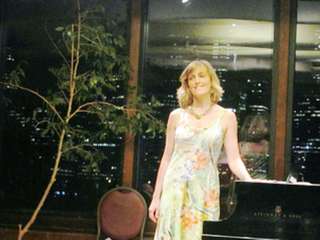|
Back
Prospero on the Piano New York
BargeMusic
10/04/2019 -
Claude Debussy: From Preludes, Book I: “Ondine,” & Book II: “Les Collines d’Anacapri”
Sergei Prokofiev: Sarcasms, Opus 17
Aaron Jay Kernis: Lights Before Dark – Before Sleep and Dreams
Alexander Scriabin: Sonata No. 5, Opus 53
George Crumb: From Makrokosmos, Volume 1: “Primavera Sounds (Genesis) (Cancer)” – “Proteus (Pisces)” – “Pastorale (Taurus)” – “Music of Shadows (For Aeolian Harp) (Libra)” – “Spring-Fire (Aries)” – “Dream Images (Love-death Music) (Gemini)”
Olga Vinokur (Pianist)

O. Vinokur at BargeMusic (© Samuel A. Dog)
“Although technical discussions are interesting to composers, I suspect that the truly magical and spiritual powers of music arise from deeper levels of our psyche.”
George Crumb (1929-)
“I am a moment illuminating eternity...I am affirmation...I am eternity.”
Alexander Scriabin (1872-1915)
I mean no disrespect to the wondrous Olga Vinokur, but the sparse audience at last night’s recital opened a musical magic box that her usual BargeMusic full house could never achieve. Granted, it was partly her transcendental choices for the hour recital. But also, one felt a rare intimacy. The twilight boats passing in the East River behind her, the closeness of the listeners and the sounds themselves approached the idea of being in the studio of Manet (or in this case, Picasso) watching the artist at work, without distraction.
Yet above all it was Ms. Vinokur’s choices which hypnotized.
A frequent visitor to BargeMusic, the virtuoso has exhibited a wide range of mastery, approaching the classics to her native-born Russian composers, to frequent delights in American music old and new.
Last night, she eschewed even the slightest hint of Central European solidity or atonal puzzles. Instead, she confined herself to color, magic and tone-painting. Even ascending to the heavens, Scriabin was less a Teutonic Prometheus, more a Tempest Prospero. With only dynamics, the early Prokofiev enlarged on his barbaric Scythians. The three other composers gave hints of their image in titles, but the tapestries were made with notes, not images incised onto stone.
The evening began with two works by Debussy. Ondine was spider-web delicate, capricious, it ran along with Ms. Vinokur’s limpid playing. The following Hills of Anacapri was perhaps too limpid, played with too much grace. One wanted more tarantella, less linear dexterity. One wanted a rustic Italian picture rather than simply good Debussy.
The Prokofiev Sarcasms had its own magic, but a magic of vengeance, torture. The young composer was, granted, not only showing off his own bravura playing, but giving later soloists, like Olga Vinokur, to issue hammer-strokes, pugnacity. She did deliver those polytonal harmonies without hesitation, the vehemence was harsh, the slower section (Smanioso, which I discovered means “yearning”) were hardly meditative, yet the aggression seemed to make sense.
If any of these magical moods were retained later, it came from the Scriabin Fifth Sonata. Wisely the pianist didn’t introduce it with the composer’s mystical poetry. That wasn’t necessary. No poem, no single picture could produce the radiant cosmos of cantabiles, giant skips, that Scriabin augmentation reaching for the heavens. Richter called it “the most difficult work”, though he made it sound easy. Ms. Vinokur created a massive sound, an anarchic fantasia, an indecipherable enigma of moods. It was a ravishing performance.
It had followed two works from a series by Aaron Jay Kernis about putting a child to sleep. Lights Before Sleep was glittering and forgettable. Before Sleep and Dreams was a berceuse, a tonal lullaby, a lovely work played with affection by the pianist.

G. Crumb at 91 with scores
The last six pieces were by that West Virginia titan, George Crumb. Years and years ago, I was totally seduced by his settings of Lorca poems. His integrity, his joy, his unassuming radicalism–up on the Pantheon with Ives and Cowell and Partch and Cage–has never let up. Two years ago, I saw him in Carnegie Hall, on the cusp of his 100th Decade, at 90, and his amiable jocular look was exactly what we wanted from a man who created such astonishing eclectic music.
Olga Vinokur played all too few of Crumb’s works from his first Makrokosmos book. Yet all the elements were there. Her piano was amplified for Dream Images (with its Chopin quotes), she played in the piano for Aeolian Harp, she tapped on the wood, she whizzed through the waters of Pisces (close to Debussy’s Poissons d’or and made the whole work come alive.
Actually. I closed my eyes for much of the music. Watching the pianist reaching in her instrument, scraping the strings, holding down the keys while working the pedals to Crumb’s precise rules was an Augean task I didn’t wish to see. This, though, was not artifice. It was the art of a splendid composer, and magically produced by this most imaginative pianist.
Harry Rolnick
|